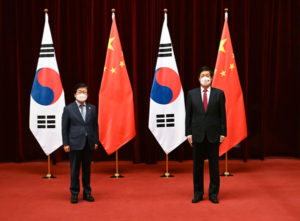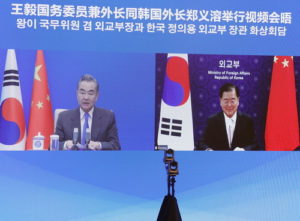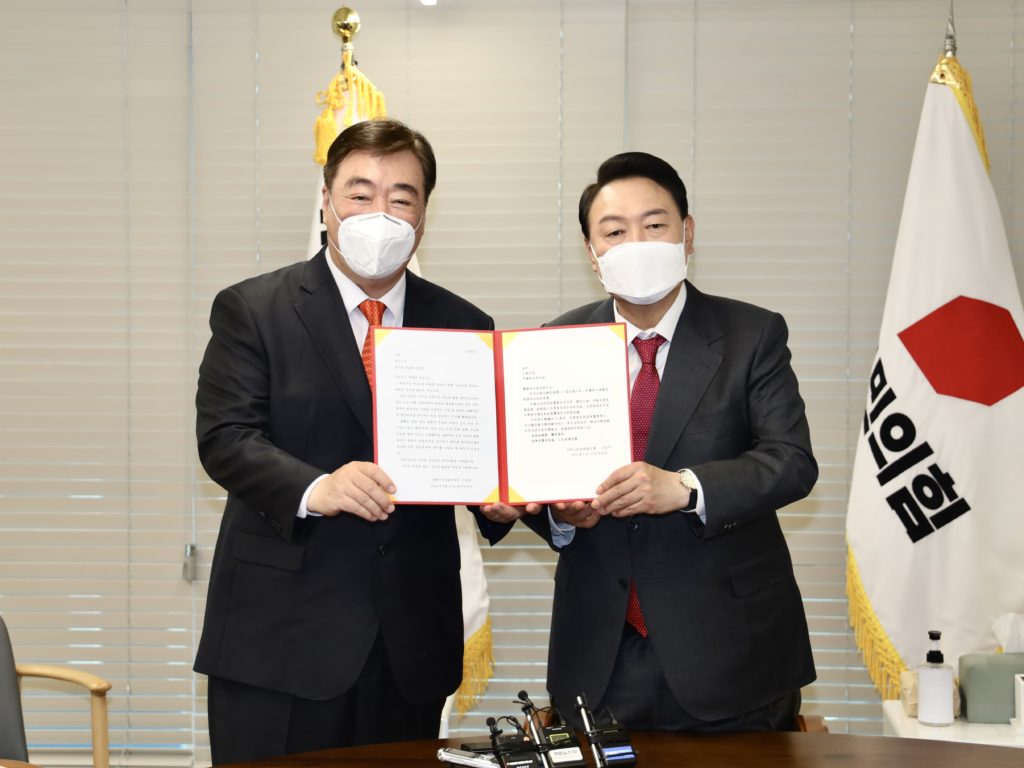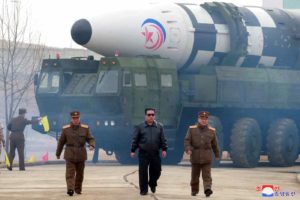Articles
The first four months of 2022 marked a turn toward difficult terrain in the China-South Korea relationship, including the challenge of managing conflicting expressions of patriotism during the Beijing Olympics. The Olympics opening ceremonies were attended by National Assembly Speaker Park Byung-seug, South Korea’s second-highest-ranking official by protocol, despite the US imposition of a “diplomatic boycott.” North Korea’s dozen missile tests since January 2022 included a “new” ICBM launch in March ahead of the 110thanniversary of Kim Il Sung’s birth and Yoon Suk-yeol’s presidential inauguration. The latest tests drove China-South Korea dialogue, new US sanctions, and reassertions from Beijing that US actions remain the decisive factor in resolving the peninsula problem. Beijing’s hosting of the Olympics and Pyongyang’s commemorations of Kim anniversaries presented opportunities for jointly reaffirming China-North Korea friendship. Despite signs of rebounding economic activity after the resumption of cross-border freight train operations in January, China’s COVID-19 lockdowns remain a source of uncertainty.
South Korea’s election of pro-US opposition candidate Yoon Suk-yeol generated a mixture of anxiety and veiled warnings from Chinese commentators. Chinese President Xi Jinping’s call to Yoon two weeks following the election was hailed as an unprecedented gesture of respect from a Chinese leader to an incoming South Korean president. But Yoon’s first congratulatory calls after his electoral victory were from Quad members as well as the United Kingdom, reflecting a distinct South Korean tilt toward the United States amid the China-US strategic rivalry. Yoon’s campaign platform posited a positive-sum relationship between his pledges to restore a “comprehensive strategic alliance” with the United States and to establish relations with China built on “mutual respect.” But it remains to be seen how Beijing will respond to the Yoon administration’s shift toward an unambiguous alignment with the US.
The Beijing Olympic Flame and the South Korean Political Tinderbox
South Korean public sentiment toward China experienced a serious and sustained downturn well in advance of the Beijing Olympics, setting up the Olympics as a potential tinderbox for expressions of anti-Chinese sentiment in Seoul. The Chicago Council on Global Affairs had documented this downturn in an April 2021 survey that showed South Korean favorability of China at 3.1 compared to a 4.8 rating in 2019. In a Korea Institute of National Unification survey, 72% of South Koreans viewed China as South Korea’s “biggest threat.” A January 2022 JoongAng Ilbo project involving data scraping of South Korean netizen comments underscored negative sentiments over Chinese encroachment on national symbols such as kimchi, hanbok, and taekwondo. These actions led netizens to ask sarcastically whether China might next claim Samsung or soccer phenom Son Heung-min as Chinese. Moreover, criticism of China among South Korean conservatives drew public rebuke from former Chinese Ambassador to South Korea Chu Guohong, signaling sensitivity to the growth and politicization of negative views toward China. Chinese netizens have responded in kind by referring to South Korea by a derogatory nickname roughly meaning “thief country.”

Figure 1 Li Zhanshu, chairman of the National People’s Congress Standing Committee, holds talks with the Republic of Korea (ROK) National Assembly Speaker Park Byeong-seug at the Great Hall of the People in Beijing on February 5, 2022. Photo: Rao Aimin/Xinhua
The Moon administration walked the tightrope between China’s desire for strong international representation in support of the Beijing Olympics and the US-led “diplomatic boycott” of the games due to China’s human rights violations. As South Korea’s official delegation head, Minister of Sports, Culture, and Tourism Hwang Hee played an essential protocol role in passing on the hosting of the 2018 Pyeongchang Olympics to Beijing in 2022. But the unofficial attendance of National Assembly Speaker Park Byeong-seug distinguished South Korea from other US allies and earned China’s public praise.
It was unsurprising in such a charged environment that South Korean netizens might respond negatively to China’s representation of the ethnic Korean minority dressed in hanbok as evidence of Chinese harmony and multiculturalism in the Olympic opening ceremonies. But that negative South Korean public response was only a precursor to an even more emotional controversy during the 1,000-meter men’s short-track skating event, in which two South Korean skaters received judging disqualifications along with the first-place Hungarian skater, paving the way for China to sweep medals at the event. This development drew sharp criticisms across South Korean society, including public denunciations from all major candidates in the March 9 presidential election. Democratic Party presidential candidate Lee Jae-myung expressed disappointment and anger at the “biased decision” of short-track Olympic judges, while Yoon Suk-yeol worried that Korean children, who learn sportsmanship by observing the rules of the game and participating in fair play, might conclude that the world is not fair.

Figure 2 Chinese Foreign Minister Wang Yi and South Korean Foreign Minister Chung Eui-yong meet virtually on Feb. 28, 2022. Photo: Ministry of Foreign Affairs, People’s Republic of China
The Chinese Embassy in South Korea responded to the Olympics controversies with three successive statements clarifying China’s position on the hanbok and short-track skating controversies and congratulating skater Hwang Dae-heon on his subsequent gold-medal win in the men’s 1,500 km event. The first statement emphasized the common ethnic heritage of Koreans and Korean Chinese citizens, both of whom had a right to claim the Korean national dress, and the need for mutual respect. The second statement defended the professionalism of International Skating Union judges and condemned the “irresponsible attitude” of South Korean media and politicians who leveled criticisms against China. The third statement offered congratulations from Ambassador Xing Haiming and expressed his hopes for the further development of friendly China-South Korea relations. The controversy led to assessments of the failure of both governments in managing national emotions, and recommendations such as that by Heilongjiang Provincial Academy of Social Sciences Da Zhigang of the need to enhance dialogue, cooperation, and exchange.
Foreign Ministers Wang Yi and Chung Eui-young held a virtual dialogue on Feb. 28 where Wang expressed appreciation for Seoul’s “friendly policy toward China, which is not only in line with the fundamental and long-term interests of the ROK, but also conducive to maintaining peace and stability.” Wang called for progress in China-South Korea FTA negotiations and for efforts to strengthen public support during the 30th anniversary of the establishment of diplomatic relations. Chung supported efforts to further develop the relationship, noting that regardless of South Korea’s presidential election outcome, both sides will strive to develop “future-oriented” bilateral relations.
Xi-Kim Olympic Exchanges Celebrate China-DPRK Partnership
The Winter Olympics presented an opportunity for Kim Jong Un to exchange messages with Xi, and also to pause weapons-testing after seven rounds in January. To mark the Games’ closing in late February, Kim projected unity and “strategic” ties with China under the “military threat of the US and its satellite forces.” He praised Beijing’s resolve against not just COVID-19, but also “hostile” actions, in an apparent reference to US-led diplomatic boycotts. North Korea’s participation in the 2022 Winter Olympics was suspended based on its refusal to participate in last year’s Tokyo Games out of health concerns.
February also marked the 80th anniversary of the birth of Kim Jong Il, driving joint commemorations in Pyongyang and Beijing. At the DPRK Embassy, Vice Chairman of China’s National People Congress Ji Bingxuan conveyed President Xi’s greetings to Kim Jong Un, met Ambassador Ri Ryong-nam, and expressed appreciation of Pyongyang’s “recent support for China on the global stage.” To commemorate Kim Il Sung’s 110th birth anniversary a month later, North Korea’s Foreign Languages Publishing House released photo books celebrating the founding leader’s diplomatic exchanges with China and Russia.
China-South Korea Relations Under Yoon Suk-yeol’s Pro-US Administration
Given the downturn in public sentiment toward China, it is notable that China did not emerge as a major issue for South Korea’s presidential candidates. But the respective campaign platforms charted differences over the degree of South Korea’s foreign policy orientation toward the United States that had implications for South Korea’s China policy. In contrast to Moon’s strategy of avoiding overt US alignment, the Yoon campaign made the “comprehensive strategic alliance” with the United States a foreign policy centerpiece while pledging to pursue relations with China based on “mutual respect.” This approach acknowledges the need for constructive and close communication with Beijing but embraces a strategic alignment with the United States. Moreover, the Yoon campaign publicly stepped on a number of Chinese red lines, including the possibility of a closer Korean relationship with the Quadrilateral Security Dialogue (“Quad”), and pledge to purchase from the United States a new Terminal High-Altitude Air Defense (THAAD) battery in direct contradiction with the Moon administration’s October 2017 statement that South Korea would not do so.
Initial Chinese media reaction to Yoon’s election suggested a mixture of anxiety and veiled warnings arguing that South Korea’s national interests and rejection of “external influence” (from the United States) would lay the foundations for a positive relationship. Global Times noted on the eve of the election that extensive trade and educational exchanges and China’s support for peninsula peace and stability serve as favorable foundations. But it cited the politically contested consensus with the Moon administration over THAAD as “a classic case of the two countries overcoming external influence,” arguing that stable relations with China are a prerequisite for South Korea’s national security.
Two days after the election, Global Times addressed the Yoon campaign’s pursuit of “mutual respect”-based relations, arguing that mutual respect is a basic Chinese diplomatic principle and rebutting South Korean views that China has not respected South Korea. The editorial then argues that the Moon administration’s 2017 “three noes” statement with China pledging not to join the US missile defense network, join a US-Japan-South Korea military alliance, or deploy additional THAAD batteries was not only a product of mutual respect, but a prerequisite for maintaining normal China-South Korea relations. While asserting that “the THAAD system has exceeded the defense needs of South Korea,” it also argues that “real security must be common, comprehensive, cooperative, and sustainable” and that “China’s strategic security interests must also be respected by Seoul.” On the same day, Ambassador Xing Haiming met President-elect Yoon to convey Xi Jinping’s formal letter of congratulations and to exchange views on the development of bilateral relations.

Figure 3 Ambassador Xing Haiming meets President-elect Yoon to convey Xi Jinping’s formal letter of congratulations and to exchange views on the development of bilateral relations. Photo: Embassy of the People’s Republic of China in the Republic of Korea
On March 25, Yoon received a congratulatory call from Xi, marking the first time that a Chinese leader had called a South Korean president-elect. The call emphasized the 30th anniversary of diplomatic normalization, timely communication to “maintain continuity and stability” in bilateral relations, and regional stability. Following the call, the Global Times asserted that the United States is the primary source of disturbance in China-South Korea relations, stating that “China has always respected South Korea’s independent foreign policy, but China-South Korea relations shouldn’t be an appendix to China-US ties.”
Ambassador Xing followed up Xi’s call with an April 6 visit to Yoon transition committee chairman Ahn Cheol-soo, discussing China-South Korea relations and conveying North Korea’s concerns about US-North Korea relations. The following day, Xing gave a public presentation expressing his desire that “THAAD” not become a “sensitive word” between the two countries, and arguing that China-South Korea relations should be mutually beneficial.
Renmin University scholar Cheng Xiaohe wrote on the Moon administration’s Quad policy and its evolution, arguing that “China respects South Korea’s cooperation with other countries and organizations, but such cooperation should not be achieved at the expense of China’s national interest.” Tsinghua University’s Liu Jiangyong asserted that although Yoon seeks to strengthen cooperation with the US and Japan and to take a tougher response to North Korea, Yoon would not want to sacrifice the China-South Korea relationship for an alliance with them.
DPRK Tests Trigger Sanctions and Dialogue
North Korea signaled its frustration over planned annual US-ROK military drills by firing two short-range missiles on April 16, its 12th missile test of 2022. Timed around Kim Il Sung’s 110th birth anniversary, the latest launch mitigated fears that Pyongyang would mark the major national holiday with bigger shows of force. The test appeared less powerful than other recent ones, most notably the March 24 intercontinental ballistic missile (ICBM) test claiming capabilities of targeting the United States. Although the ICBM launch raised debate on whether it was indeed the “new” missile Pyongyang showcased in the October 2020 military parade, it amplified inter-Korean security concerns as President-elect Yoon promised to expand military drills with the United States to deter DPRK aggression.

Figure 4 North Korean leader Kim Jong Un walks away from what state media call a “new type” of intercontinental ballistic missile in an undated photo released March 24 by the official Korean Central News Agency. Photo: KCNA via Nikkei Asia
Pyongyang’s ICBM test was its first such test since 2017, leading Washington to impose new sanctions on Russia and North Korea-based entities on March 24, along with sanctions against a Chinese company for supporting Syria’s weapons program. It also prompted China-ROK communication on DPRK denuclearization, including telephone talks between Xi and Yoon on March 25, and nuclear envoys Liu Xiaoming and Noh Kyu-duk on March 26.
DPRK military threats challenged regional diplomacy, including US Special Representative Sung Kim’s separate talks with ROK and PRC counterparts in early April, and his visit to Seoul later that month to meet Yoon and key foreign policy and unification officials. At China’s National People’s Congress press conference on March 7, Foreign Minister Wang Yi insisted that resolving Pyongyang’s “legitimate security concerns … will still largely depend on what the US will do: whether it will take the actions needed to settle the issues on the Peninsula or continue to use them as a geostrategic leverage.” Affirming solidarity with Beijing, the DPRK foreign ministry reacted to the White House’s February report on US Indo-Pacific strategy by calling it a “long-term plan to isolate China in the Asia-Pacific.”
China’s Stepped-Up Diplomatic Consultations on Korean Affairs
China’s Special Representative for the Korean Peninsula Liu Xiaoming has undertaken a more active travel schedule from the beginning of 2022, signaling more visible Chinese diplomacy to monitor the international response to North Korea’s stepped-up missile testing. Following telephone consultations with his South Korean counterpart Noh Kyu-duk on Jan. 20, Feb. 18, and March 26, and in-person consultations in Moscow with Russian Vice Foreign Minister Igor Morgulov, Liu made his first visit to Washington in April for discussions with US senior officials. Liu held consultations at the United Nations in New York and visited France and Germany for consultations with European counterparts. He reiterated China’s policy of supporting Korean Peninsula denuclearization and peace through dialogue, expressed concerns about the escalation of tensions, and argued that “the legitimate and reasonable concerns of the DPRK should be taken seriously and addressed.” US Ambassador Sung Kim reasserted to Liu that the United States has no hostile intent toward North Korea and is open to resumption of talks with Pyongyang on all concerns, including sanctions relief.
China’s Multilateral Economic Cooperation with South Korea and Resumption of “Normal Bilateral Trade” with North Korea
China-South Korea economic cooperation took a step forward with the coming into force of the Regional Comprehensive Economic Partnership (RCEP) in South Korea in February. China Institute of International Studies Research Fellow Xiang Haoyu observed that South Korea’s RCEP membership would improve China-ROK trade relations, which experienced record growth in 2021. RCEP is projected to enhance bilateral trade in the electronics, machinery, food, marine products, cosmetics, and e-commerce sectors.
On the other hand, the Korean Chamber of Commerce and Industry and South Korean businesses held a meeting on April 29 to review the impact of the Shanghai lockdown, with special reference to the potential negative impact on South Korea’s supply chain. The meeting reflected South Korean recognition of the close macroeconomic linkages between the two economies and risks of a Chinese economic slowdown for South Korean growth prospects.
China-DPRK trade remains at about half the pre-pandemic level, dropping by almost 90% (2019-2021) after North Korea’s border closure in January 2020. Dandong-Sinuiju freight train operations resumed this January, supporting“normal bilateral trade” according to the PRC Foreign Ministry. Based on Chinese customs data, bilateral trade in January-February grew more than 40-fold compared to the same period last year, driven by DPRK imports of key necessities like food, pharmaceuticals, and construction materials. At the end of April, China and North Korea resumed a joint trade fair that was suspended from 2016 after Beijing supported UN sanctions against Pyongyang. Held in Dandong since 2012, the latest online fair was North Korea’s first international trade engagement since COVID-19.
The Ukraine crisis draws attention to the implications of global energy price shifts for China-DPRK coal trade. In April, the price of smuggled North Korean coal into China reportedly reached more than twice the pre-pandemic value of DPRK coal exports, but still half of Chinese prices and less than a quarter of global prices. But North Korea’s hopes for a sustained recovery are muted by the current COVID-19 outbreak across its border, where Jilin fights China’s worst regional pandemic crisis since Wuhan in 2020. Provincial Party Secretary Jing Junhai pointed to a “critical stage” in March, when Jilin’s reported figures peaked to 75% of China’s new locally transmitted cases. As China’s foreign ministry confirmed on April 29, Dandong-Sinuiju freight train operations were again suspended due to renewed COVID-19 concerns.
Yoon’s Dual Pursuit of a “Comprehensive Security Alliance” with the United States and a China-South Korea Relationship Based on “Mutual Respect”: Zero-Sum or Win-Win?
President-elect Yoon is scheduled to meet President Biden only 11 days after the launch of his administration, in a summit that symbolizes US-South Korean security linkage and the extent to which Yoon has placed Washington at the center of his global strategy. The closeness of this alignment has led China to reiterate its markers for managing the Seoul-Beijing relationship around THAAD while observing closely the depth of the Yoon administration’s alignment with Washington and Tokyo. Yoon has asserted the desire for a positive relationship with Beijing based on “mutual respect,” an early sign of which may revolve around Xi’s willingness to make a long-anticipated visit to Seoul. Xi’s visit has been delayed in part by the pandemic and in part by the need to manage political risks around the growth of negative public sentiment on both sides.
In response to DPRK missile tests, Seoul’s conservative turn, and perhaps the perceived risk of US-DPRK crisis escalation, China has reactivated its North Korea-focused diplomacy through active outreach to Washington and Europe, and continued calls for the United States to make concessions necessary to bring Pyongyang to the negotiating table. But given the likelihood that such concessions will go unreciprocated, and that North Korea may continue testing essential to military development goals, all parties are more likely to come together in the aftermath of crisis rather than in a joint effort to prevent a crisis. Moreover, the strengthening of Seoul’s strategic alignment with Washington runs the risk of exposing fissures in the China-ROK relationship that Beijing has signaled might have negative implications for peninsula security. Rising tensions in Northeast Asia also threaten to hold back Yoon’s aspiration for South Korea to be a “pivotal global state.” Much will depend on how Yoon handles his transition to power, and whether he can actually forge a positive-sum relationship with Beijing and manage potential provocations by Pyongyang despite the intensifying Sino-US rivalry.
Jan. 1, 2022: China and North Korea resume Dandong-Sinuiju freight train operations.
Jan. 6, 2022: China announces tightened quarantine guidelines for travelers entering from South Korea.
Jan. 13, 2022: PRC State Council announces that from Feb. 1 China will implement RCEP tariffs on selected ROK imports.
Feb. 3, 2022: Culture, Sports and Tourism Minister Hwang Hee departs for Beijing leading South Korea’s government delegation to the Winter Olympics.
Feb. 4, 2022: China’s National People’s Congress Chairman Li Zhanshu meets ROK National Assembly Speaker Park Byeong-seug, who attends the Winter Olympics opening ceremony.
Feb. 11, 2022: Protestors near the PRC Embassy in Seoul protest Beijing Winter Olympics officiating.
Feb. 12, 2022: PRC and Russian ambassadors to North Korea meet at the PRC Embassy in Pyongyang.
Feb. 16, 2022: NPC Vice Chairman Ji Bingxuan addresses a DPRK Embassy event commemorating Kim Jong Il’s 80th birth anniversary.
Feb. 18, 2022: PRC and ROK nuclear envoys hold telephone talks.
Feb. 20, 2022: Korean Sport and Olympic Committee confirms South Korea’s decision not to appeal the Beijing Winter Olympics refereeing of short-track speed skating.
Feb. 21, 2022: Xi Jinping and Kim Jong Un exchange messages on the Beijing Winter Olympics closing.
Feb. 25, 2022: PRC and ROK foreign ministers hold video talks.
March 10, 2022: China’s foreign ministry in a regular press briefing congratulates ROK President-elect Yoon Suk-yeol on his election victory.
March 11, 2022: President-elect Yoon Suk-yeol and PRC Ambassador Xing Haiming meet in Seoul.
March 22, 2022: Kim Jong Un sends a condolence message to Xi Jinping over a China Eastern airline crash.
March 23-24, 2022: Chinese (March 23) and Russian (March 24) military planes enter South Korea’s air defense identification zone (KADIZ) without notice.
March 24, 2022: President Moon Jae-in sends a condolence message to Xi Jinping over China Eastern airlines’ crash.
March 24, 2022: Pyongyang test-fires an ICBM into the East Sea.
March 24, 2022: US State Department announces new sanctions on entities and individuals in Russia, North Korea, and China for proliferation activities.
March 25, 2022: Xi Jinping and Yoon Suk-yeol hold telephone talks.
March 26, 2022: PRC and ROK nuclear envoys hold telephone talks.
April 6, 2022: Seoul’s transition team leader Ahn Cheol-soo meets PRC Ambassador Xing Haiming.
April 29, 2022: China and North Korea resume an international trade fair online after a seven-year hiatus. They suspend Dandong-Sinuiju freight train operations over renewed COVID-19 concerns.
April 29, 2022: ROK Trade Minister Yeo Han-koo meets PRC Ambassador Xing Haiming in Seoul.